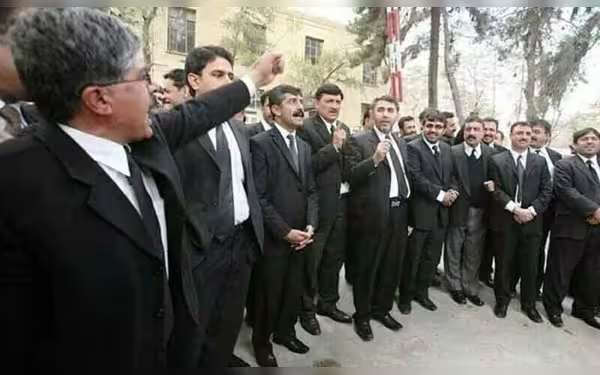Saturday, November 16, 2024 05:36 PM
Lawyers Unite Against Proposed Constitutional Amendments in Pakistan
- Lawyers vow to resist constitutional amendments threatening judiciary independence.
- Prominent legal figures express concerns over external influences on parliament.
- Call for transparency regarding the origins of proposed amendments.
 Image Credits: dawn
Image Credits: dawnLawyers across Pakistan unite to oppose proposed constitutional amendments threatening judicial independence and call for transparency.
PESHAWAR: In a significant gathering held on Saturday, lawyers from across Pakistan convened to express their strong opposition to proposed constitutional amendments. These amendments include the establishment of a federal constitutional court, which many legal experts believe could undermine the independence of the judiciary. The lawyers, united in their stance, declared that they would not accept any changes to the Constitution that were drafted by "someone else," emphasizing their belief that the parliament should not merely act as a rubber stamp for external influences.
During the convention, a resolution was unanimously adopted, highlighting the lawyers' commitment to resist these amendments and protect the fundamental structure of the Constitution. The participants voiced their concerns about the potential consequences of allowing the country to be governed by the whims of the establishment rather than the will of the people. They pledged to initiate a sustained struggle against these proposed changes.
The event, titled "All Pakistan Lawyers Convention," was organized by the Peshawar High Court Bar Association. It served as a platform for prominent legal figures to discuss the implications of the proposed amendments. Notable speakers included former president of the Supreme Court Bar Association Hamid Khan, PHC Bar Association president Fida Gul, and several other distinguished lawyers.
Hamid Khan, addressing the convention via video link, raised alarms about a potential move to dismantle the 1973 Constitution of Pakistan through these controversial amendments. He warned that if lawyers do not unite against these changes, the Constitution could become ineffective. Khan pointed out that the amendments appear to be designed to weaken and divide the judiciary, stating, "Those who are bringing the amendments are scared of an independent judiciary." He firmly asserted that the proposed draft conflicts with the Constitution's basic structure and that the legal community must stand firm against any attempts to compromise judicial independence.
Fida Gul echoed these sentiments, asserting that while it is the parliament's right to amend the Constitution, it should not simply accept drafts from external sources. He emphasized the importance of maintaining the integrity of the judicial system, especially with the impending retirement of the Chief Justice of Pakistan. Gul suggested that a bench of Supreme Court judges should handle constitutional matters rather than establishing a new constitutional court.
Concerns were also raised about the independence of the proposed constitutional court, particularly regarding the appointment of its chief justice by the prime minister. Syed Akhtar Ali Shah questioned how such a court could operate independently under these circumstances. He highlighted the current restrictions on freedom of expression and movement, noting that major roads are blocked, which limits the rights of citizens.
Moazzam Butt called for transparency regarding the origins of the proposed amendments, suggesting that they were not the product of political parties but rather the "brainchild of the establishment." He challenged the establishment to hold a referendum if it truly believed it had the support of the people. Noor Badshah reminded attendees that the country was founded by lawyers, not the establishment, urging unity among the legal fraternity to prevent the passage of these amendments.
As the legal community rallies against these proposed changes, it is clear that the stakes are high. The independence of the judiciary is a cornerstone of democracy, and any attempts to undermine it could have far-reaching consequences for the rule of law in Pakistan. The lawyers' commitment to resist these amendments reflects a broader concern for the future of democratic governance in the country. As discussions continue, it remains crucial for all stakeholders to engage in dialogue that prioritizes the Constitution and the rights of the people.













